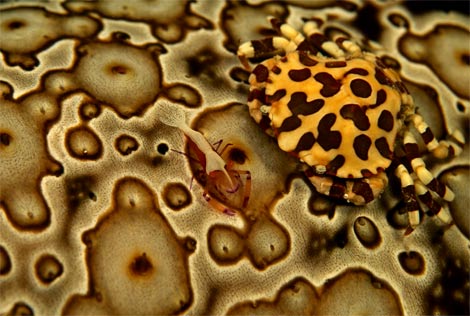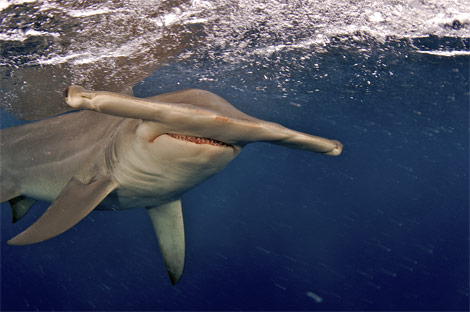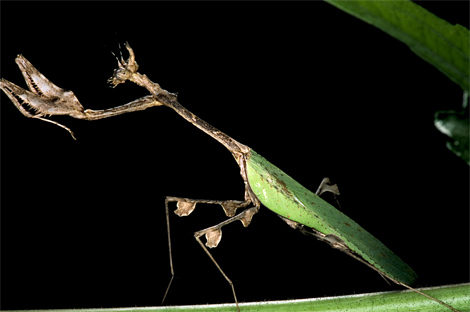(单词翻译:单击)
斐济群岛 Fiji Islands
在斐济群岛的水域中,帝王虾和寄居蟹消失隐秘在大豹海参皮肤上豹纹中。海参用它皮肤上的粘液提供食物给这些甲壳类动物,而当它受到威胁的时候,则会把有毒污秽的胃部器官喷射出来,以保护自己。
Photograph by Tim Laman
In the waters of the Fiji Islands, an emperor shrimp and a commensal crab nearly vanish in the calico pattern of a large leopard sea cucumber. The sea cucumber provides food for the crustaceans in the form of mucus on its skin and defends itself by ejecting its toxic stomach when danger threatens
锤头鲨 Hammerhead Shark, Bahamas
外表上看起来原始,长着巨大的锤状头,就像图上这只一样的锤头鲨,实则是鲨鱼里进化最先进的种类。它的拉开式眼睛和鼻孔提供敏锐的外部感觉,嘴上细小的感受器能助它精确捕食。许多锋利的牙齿则是尽享美味的工具。
Photograph by Brian SkerrY
Primordial in appearance, great hammerheads, like this one near the Bahamas, are actually among evolution’s most advanced sharks. Wide-set eyes and nostrils provide keen peripheral senses, and tiny electroreceptors on its snout help it pinpoint prey. Dozens of serrated teeth do the rest.
螳螂 Stick Mantid, Cameroon
在大约1800种螳螂中,大多将他们的时间花在静坐和等待中,看起来犹如虔诚的祈祷者,常被称为“祈祷螳螂”。这些既像拥有高超捕获技巧的猎人又似隐秘刺客的合掌螳螂,以神秘的双重身份的让人类为之痴迷了数千年,古代希腊人最早在神秘学中使用到这个词mantis【螳螂】——预言者。
Photograph by Mark Moffett
Most of the roughly 1,800 species of mantids-often called praying mantises-spend their time sitting and waiting, seemingly at prayer. These highly skilled hunters and masters of disguise have fascinated humans for thousands of years; the ancient Greeks first used the term mantis, meaning “prophet.”
北极狐 Arctic Fox, Hudson Bay, Canada
在加拿大哈德逊湾,一只神秘的北极狐悄悄地跨越被雪覆盖的山脊。这些不比小猫大很多、看似脆弱的北方哺乳动物,自始至终都衷诚地在贫困和严寒的极北茁壮地成长。
Photograph by Norbert Rosing
A stealthy arctic fox steals across a snow-patched ridge in Canada’s Hudson Bay. Not much larger than a big housecat, these seemingly delicate northern mammals are as hearty as they come, thriving in the privation and bitter cold of the Arctic north.


